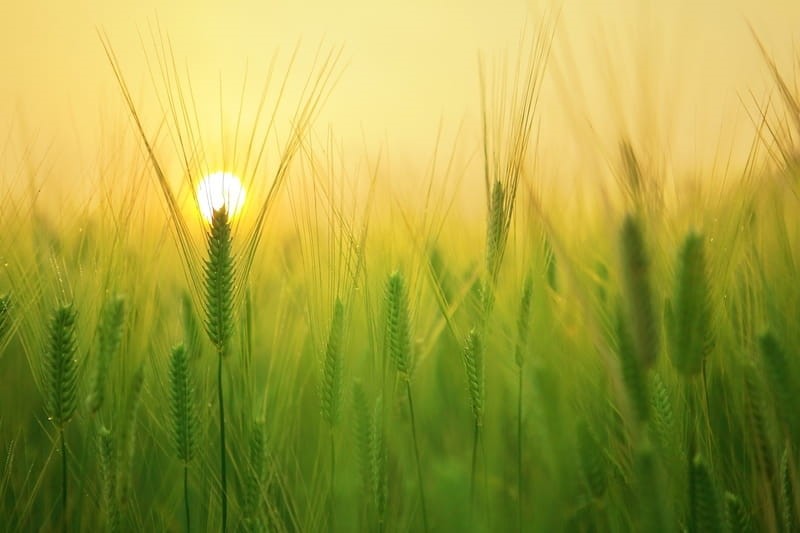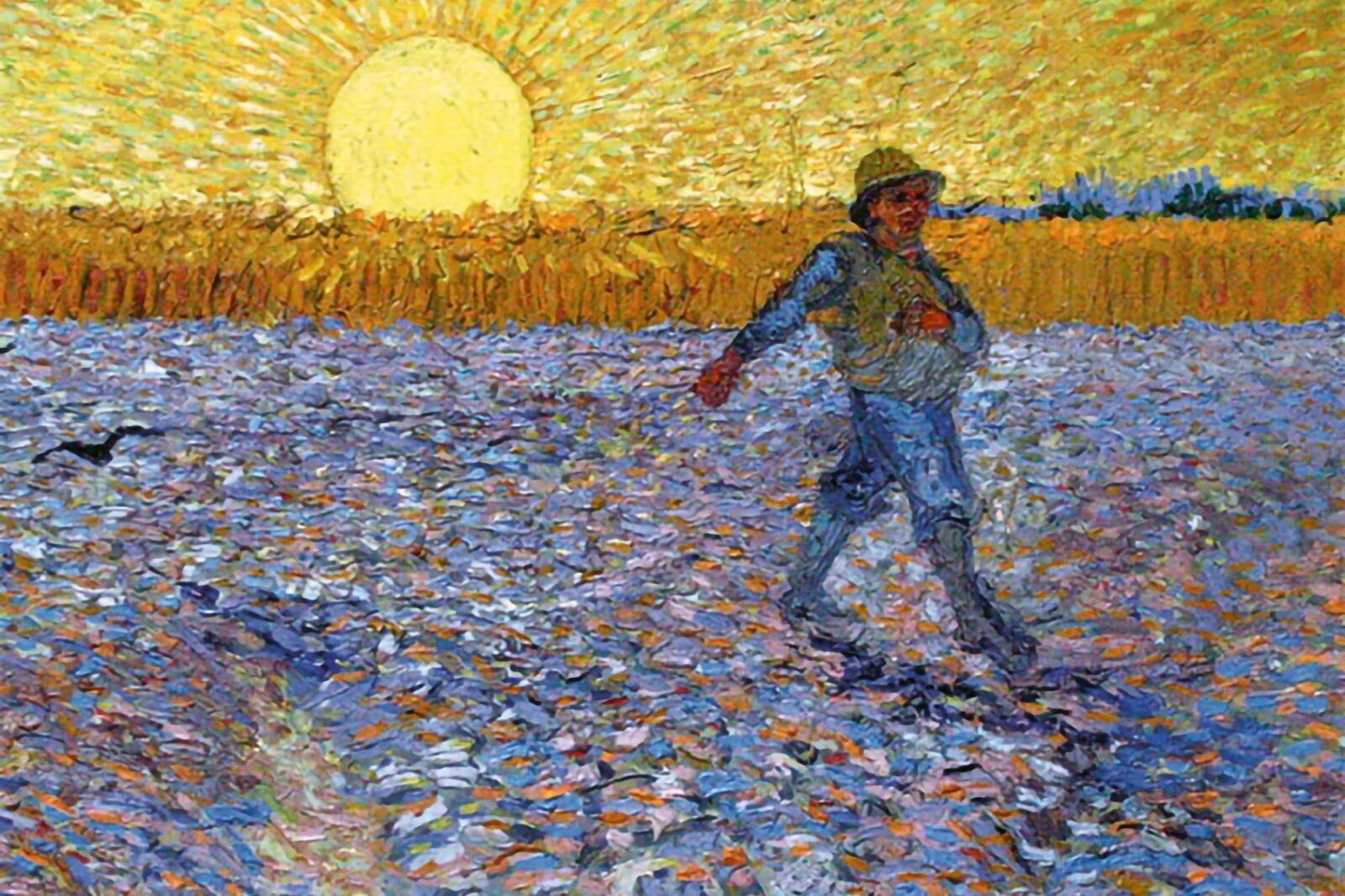Click here to view the recording of the Facebook Live Stream of this service.
Sunday School
Click here for our activity sheet for children and families.
Collect
Almighty God, send down upon your Church the riches of your Spirit, and kindle in all who minister the gospel your countless gifts of grace; through Jesus Christ our Lord.
Amen.
Readings
Sermon – Parable of the Sower
by Mother Katie
Today we have one of the most well known stories of the bible.
The parable of the Sower – which could also be the parable of the scattered seed – or the parable of the different soils – or even the parable of the foolish farmer.
For who scatters precious seed everywhere – even the places you know it won’t grow?
This parable is found in all 3 synoptic gospels and it opens the section on parables in Matthew thus giving it star billing. We are meant to sit up and pay attention.
So much so that Jesus goes out on the lake to share this story – not strictly because he was practising social distancing – but because voices carry well over water – he wanted this to be heard. He didn’t want the people at the back – the people online to miss out – he wanted everyone to hear.
“Listen!” he says – this is the first word, before we even get to the story. It will also be the last word of the parable – it is the bookend ends for the story we are about to be told. Listen!
In other words – sit up and pay attention – because if you want to understand the rejection and persecution that that frames this chapter for Jesus then you are going to need to understand this field.
A story of a field in which we can find ourselves playing every part – from sower to soil – from seed to hard ground – birds to rocks and thorns.
And it is about how we become rooted in God – how we grow in obedience and wisdom and grace – and how we produce a harvest for the Kingdom. BUT it is also about we can prevent that happening – in our lives and the lives of others – it is about how we waste the precious seed God wants to sow into our lives and the judgment that invites.
There are some missing verses in our reading today from the lectionary – Matthew 13:10-17 – and they are worth looking at – as they do not spare us the confronting truth of judgment.
None of us are the good soil all the time. Some may never be hospitable ground for the word of God.
We all have moments we are hard like the path; we are shallow like soil with rocks and overwhelmed like seed growing in thorns.
And sometimes – and worse still – we are the birds, the rocks, the thorns that prevent others from growing to be all they could. And instead of being the generous sower – liberally giving in abundance even when it is not deserved or justified – we take for ourselves, we put others in the shade and demand more than we need just because we can.
And this is a picture of the Kingdom as it grows – where sheep and goats – wheat and tares – exist together and even within us until the final judgment.
And until then – it is our task to hear – to listen – to obey – to be all we can be to be good soil for God – and to help create good soil for others – following Jesus in sowing goodness liberally wherever we can.
As I’ve been thinking about this parable my garden has literally lived it.
Recently the kids got a blow up pool and we put it down to play in during the hot weather – we picked the sunniest and best spot we could find – it was only there a couple of weeks – but when we took it down the ground underneath was dry, hard and the grass had completely withered away.
It had been flattened by carrying a heavy load and being deprived of water and sunlight.
It didn’t ask for a pool to be put there – it clearly didn’t like the pool being there – and now it was dying.
And like my lawn there are times in our lives when things press down on us – and when life is unbearably dry and dark. We might even forget what we are for – what our purpose in life is to be and so we give up and stop trying to grow at all – we simply might not have what it takes to grow anymore.
In order to bring my garden back to life – and to remind it that it was actually a beautiful lawn and not a large patch of ugly mud – I needed to pay it some attention.
First we cut the grass on all the lawn – then we raked the soil of the bare patch – planted more grass seed and feed and watered the hard ground.
And now 8 days later it is recovering – in some patches it is even looking better than before! Other bits will still require attention for sometime to come.
As I tended this patch of damaged earth I thought of the parable – if I had not raked the earth – the seeds would have sat on top – and birds and other animals would have eaten it.
For hard soil needs to be broken, turned upside down a little, then feed and refreshed – and tended with care if you want it to be fertile ground again. It takes a bit of work.
I looked at other patches in my garden – some wood or rocks need removing, weeds cut back, a fence mending or rose trellis fixed. I couldn’t possibly do it on my own – in fact I rely heavily on the help of a gardener.
And I thought our lives are like the farmer’s field – or my garden – if we want them to grow with God we will need to pay them some attention; we will need to put in the work; and we will need to help others grow by sowing seed with generous abandon – all the time remembering we are never asked to do the work alone – we work with a skilled gardener who promises to carry the heavy work for us.

And just as the gardener loves the garden too much to leave it as it is – so God loves us just as we are but he loves us too much to leave us that way. Transformation is at the heart of the Gospel – at the heart of this parable. And to be transformed means being open to change; it requires a courageous honesty about ourselves and a determination to do the work.
As we start to come out of lockdown and learn to live with the pandemic I have been wondering what transformation God wants to see in the church, in our own lives and in the world.
Surely the movements to support Black Lives Matter and the Environment would have to be examples of potential soil from which a great harvest could come? But both these groups represent earth that has been flattened by oppression and global economic forces that pay no attention to justice – so I can see there are birds circling around the these small and hopeful seeds.
And I think it is our job to protect the seed and tend the earth till it takes root – for surely these are both Gospel imperatives?
And I’d like to the think the church has learnt something new about prayer and listening and being with God rather than constantly striving and doing for him, we’ve been made to sit in our cell – and that should produce a harvest of wisdom. But as we reopen whilst I see some wonderful lessons learnt and new things sprouting forth I also fear that often the roots are shallow – and could be easily burnt up in the busyness of back to normal – we need to care for these young shoots if we want to protect some of what we have gained.
And when I’ve asked people what they have learnt from lockdown many reply that we don’t need so much stuff – that what really matters isn’t what we consume – in fact it could even be part of the problem. And yet the thorns of a materialistic life are already marking their space again.
So we need to listen! Really, really listen to God over these next few weeks – because what we harvest from the experience of this pandemic – will depend on it. What soil we become – what conditions we provide for others – what seed we can sow – will all start with that one word – Listen.
In deep listening the earth of our lives is turned; the soil watered; and the light calls forth growth.
Our missing verses today contained a passage from Isaiah – in another verse from that book it says this – “Incline your ear, and come to me; listen, so that you may live.”
So I encourage you to take time to listen to God this week and attend to the soil of your soul.
Amen.
